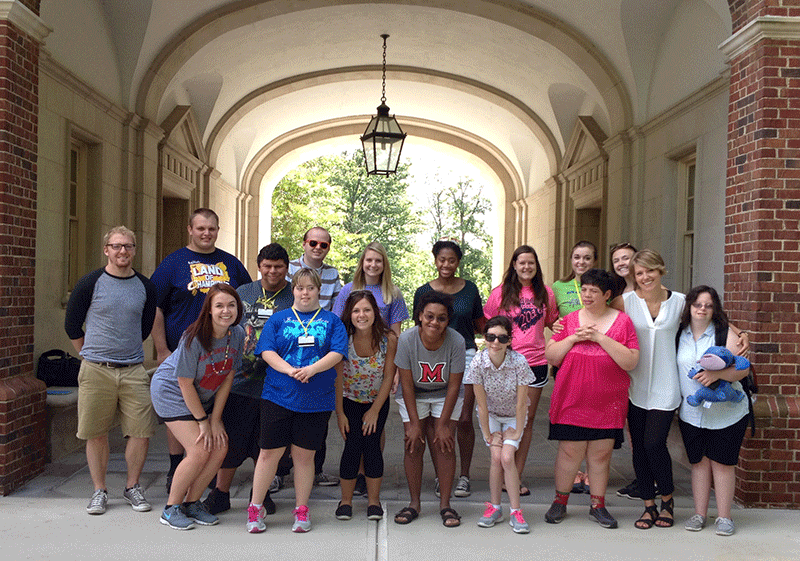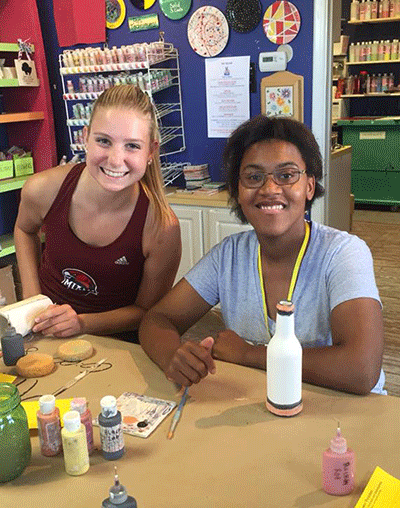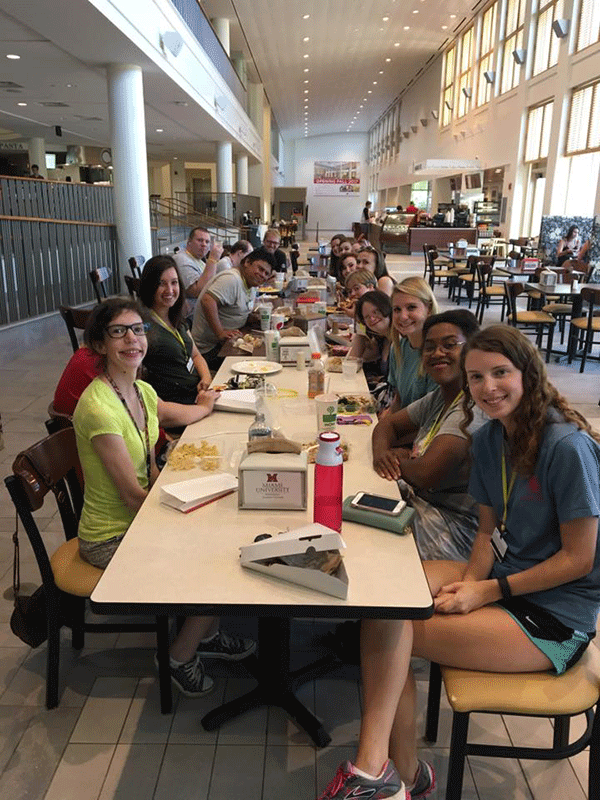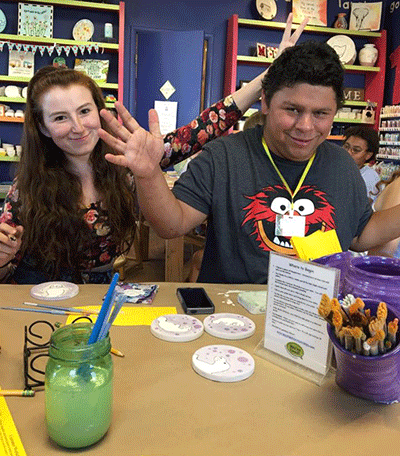

Inclusive program opens classroom doors and minds

Lauren Tarapchak, junior, with Nika Swagler.
By Carole Johnson, university news and communications
Nika Swagler’s goal for college is simple: to learn how to be a leader.
Taking her first course this summer at Miami University, she’s already a step ahead of many first-year students. She is a full-time employee at ThyssenKrupp Bilstei of America Inc. in Hamilton. She understands responsibility and wants to take her knowledge further to help others.
Swagler is one of seven students with intellectual disabilities participating in a one-week, one-credit-hour course. The course is led by Ashley Johnson, clinical faculty in special education in the department of educational psychology.
Miami undergraduate students are also earning course credit. They are helping Swagler and her classmates settle into residence hall living, navigate class schedules, taste the treats at Armstrong Student Center and tackle the homework.
Yes, there is homework. From creating personal videos of their days at Miami to writing journal entries, the students will tell you they like homework. Really.
The course is Miami’s phase one of a long-term goal to incorporate an inclusive university program for individuals wanting post secondary opportunities. Similar programs exist nationwide, with some students earning degrees. However, the application process is competitive.
This is Miami’s second year for this course and the first year students earned college credit. Johnson is hopeful that this experience and the credit will increase their chances of getting into those programs.
The goal is to increase access
Miami’s goal is to increase access for students with intellectual disabilities to take classes, work on campus and engage in service learning at the university.

Experiencing campus life, including dining services, is part of the inclusive program.
The course focuses on the same content Johnson teaches in her disability studies class throughout the year.
“Our students are learning about self-advocacy, the disability rights movement and the field of disability studies,” Johnson said. “We're challenging students to shift their own self-advocacy from finding a way to fit into society, to advocating for societal change to have more inclusive and accessible communities.”
Swagler finds the introductory course experience “better than high school.” With a bright smile and laughing eyes, she enjoys talking about self-advocacy and what that means.
“It’s your right to spend money how you want and save money how you want. I like the responsibility of having a full-time job, paying my bills, having an apartment, buying my own clothes,” she said. “I want to learn how to be a leader so I can teach others.”
Carlos Coral, on the other hand, can’t wait to build, or at least plan for a remodel.
During the course, students formed project teams, and his team developed ideas to make a classroom more accessible.
Victoria Sampson, a second-year student at Miami, said the idea for a prototype of a classroom began last year. Johnson’s spring introduction to disability studies class wanted to improve upon the accessibility within McGuffey Hall.
Miami’s College of Education, Health and Society received funding to develop the prototype. The room will feature an adjustable teaching station, a power door for ease of entry, new lighting and movable tables and chairs.

Anna Hill, senior, with Carlos Coral
Other student projects included a Facebook Art page. Here students learned about self-advocacy and marketing concepts to promote their artwork.
Another Facebook project focuses on disability rights and offering a venue for support.
Emily Lacker, a senior special education major, said, “The site will be run by students with disabilities for students with disabilities. It will provide a safe place to talk about their rights.”
Sami Stevens and her sister, Sydney, both enjoy rooming with the students and showing them “that college is much more than taking classes,” Sydney said. Sami is a first-year kinesiology major, and Sydney is a senior special education major.
“It’s cool to see everyone at the nighttime activities, making friends. Other students who are here taking classes even join us for the events — normal things that college kids do.”
The 13 Miami students in the summer course joined with members of Inclusive University Program Allies during a weeknight kickball game. More than 30 students helped showcase just one of Miami’s 400 plus student-led organizations.
A member of Miami’s Best Buddies Program, Swagler already knows about Miami’s student organizations — giving her another step ahead.
